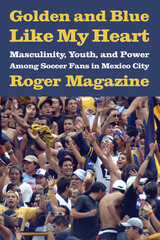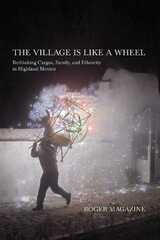2 books by Magazine, Roger

Golden and Blue Like My Heart
Masculinity, Youth, and Power Among Soccer Fans in Mexico City
Roger Magazine
University of Arizona Press, 2007
For fans of pro soccer in Mexico City, the four most popular teams represent distinct identities that embody such attributes as political power, nationalism, and working-class values. One of these teams, the Pumas, is associated with youthfulness, and its equally youthful fans take pride in the fact that their heroes have not yet been corrupted by corporate or political interests. This ethnographic study examines Puma fans’ understanding of the ideal that the team represents, considers the practices they employ to express and sometimes contradict this ideal, and reveals how soccer fandom in contemporary Mexico has emerged as a nexus of tensions among competing visions of state and society.
Roger Magazine takes readers inside Mexico’s soccer stadiums to explore young men’s participation in struggles over the future of that country’s urban society. His firsthand observations of the fan clubs—las porras—yield a unique inside look at confrontations in the stands over group organization, particularly at the emergence of rebel segments within the clubs. His study offers a close-up look at ground-level struggles over social organization in contemporary urban Mexico, showing how young male fans both blindly reproduce and consciously manipulate images of violence and disorder derived from national myths about typical urban Mexican men.
Golden and Blue Like My Heart offers a new way of understanding the dynamics of fandom while shedding new light on larger social processes and youth culture in Mexico. And with its insight into soccer culture, politico-economic transition, and masculinity, it has important and wide-reaching implications for all of Latin America.
Roger Magazine takes readers inside Mexico’s soccer stadiums to explore young men’s participation in struggles over the future of that country’s urban society. His firsthand observations of the fan clubs—las porras—yield a unique inside look at confrontations in the stands over group organization, particularly at the emergence of rebel segments within the clubs. His study offers a close-up look at ground-level struggles over social organization in contemporary urban Mexico, showing how young male fans both blindly reproduce and consciously manipulate images of violence and disorder derived from national myths about typical urban Mexican men.
Golden and Blue Like My Heart offers a new way of understanding the dynamics of fandom while shedding new light on larger social processes and youth culture in Mexico. And with its insight into soccer culture, politico-economic transition, and masculinity, it has important and wide-reaching implications for all of Latin America.
[more]

The Village Is Like a Wheel
Rethinking Cargos, Family, and Ethnicity in Highland Mexico
Roger Magazine
University of Arizona Press, 2012
In this modern-day anthropological manifesto, Roger Magazine proposes a radical but commonsense change to the study of people whose understanding of the world differs substantially from our own. Specifically, it argues for a major shift in the prevailing approach to the study of rural highland peoples in Mexico. Using ethnographic material, Roger Magazine builds a convincing case that many of the discipline’s usual topics and approaches distract anthropologists from what is truly important to the people whose lives they study. While Western anthropologists have usually focused on the production of things, such as community, social structure, cultural practices, identities, and material goods—since this is what they see as the appropriate objective of productive action in their own lives—residents of rural highland communities in Mexico (among others) are primarily concerned with what Magazine calls the production of active subjectivity in other persons.
According to Magazine, where Western anthropologists often assume that persons are individuals capable of acting on their own to produce things, rural highland Mexicans see persons as inherently interdependent and in need of others even to act. He utilizes the term “active subjectivity” to denote the fact that what they produce in others is not simply action but also a subjective state or attitude of willingness to perform the action.
The author’s goals are to improve understandings of rural highland Mexicans’ lives and to contribute to a broader disciplinary effort aimed at revealing the cultural specificity or ethnocentricity of our supposedly universally applicable concepts and theories.
According to Magazine, where Western anthropologists often assume that persons are individuals capable of acting on their own to produce things, rural highland Mexicans see persons as inherently interdependent and in need of others even to act. He utilizes the term “active subjectivity” to denote the fact that what they produce in others is not simply action but also a subjective state or attitude of willingness to perform the action.
The author’s goals are to improve understandings of rural highland Mexicans’ lives and to contribute to a broader disciplinary effort aimed at revealing the cultural specificity or ethnocentricity of our supposedly universally applicable concepts and theories.
[more]
READERS
Browse our collection.
PUBLISHERS
See BiblioVault's publisher services.
STUDENT SERVICES
Files for college accessibility offices.
UChicago Accessibility Resources
home | accessibility | search | about | contact us
BiblioVault ® 2001 - 2024
The University of Chicago Press









